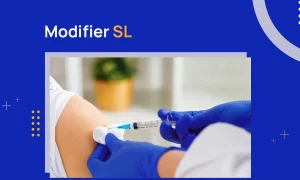What are upcoding and unbundling in medical billing? Well, to put it briefly, upcoding and unbundling are errors that healthcare providers make while filing insurance claims. Both these errors are a nightmare for healthcare providers as they are considered fraudulent activities and can have serious repercussions.
These fraudulent practices, whether intentional or accidental, can result in financial losses, legal consequences, and damaged reputations for healthcare providers. As a health services provider, you might think that these errors or instances are rare. However, this is far from the truth. According to a study, Medicare fraud, including upcoding, was estimated to cost up to $60 billion in overpaid claims in 2015, and this has only increased since then.
That is why it is essential to understand these practices in detail. In this blog, we will explain in detail what upcoding and unbundling are in medical billing. We will also provide real-world examples and explain how to recognize, report, and mitigate their occurrence.
What is Upcoding in Medical Billing?
Upcoding in medical billing is a type of error or fraudulent activity where healthcare providers use incorrect billing codes to claim higher reimbursements than they are actually entitled to.
This means that during the claim-filing process, the biller assigns a CPT code that reflects a much more complex or expensive procedure than what was actually performed. As you can imagine, it is fairly easy to do so and very difficult to detect.
However, upcoding may not always be a fraudulent activity. Rather, in most cases, it is a result of human error or system mismanagement.
The main reason behind this is the complexity of CPT codes. There are more than 11,000 CPT codes. So, naturally, selecting the correct code can be confusing.
On the contrary, a survey revealed that 18% of medical coding staff have been pressured by employers to engage in fraudulent coding, such as upcoding, for financial gain.
Examples of Upcoding
There are many creative ways in which billers can upcode. Let’s look at some examples to see how simply it can be done.
- Inflated Diagnosis Severity: One way for the hospitals to upcode is by exaggerating the severity of diseases. For example, they might classify a patient’s routine stay as one requiring high-severity care, such as a diagnosis involving acute respiratory failure. By doing this, they can claim higher reimbursements from insurance companies.
- Routine Check-ups Billed as Comprehensive Visits: Another similar way is to simply charge more by defrauding the type of check-up. To understand this, look at the following scenario. A physician conducts a standard check-up worth $100 but submits a code for an extended visit reimbursed at $150. This results in an overpayment of $50.
- Misrepresentation of Provider Credentials: This method is probably the easiest to fake. Hospitals can deceitfully state that services were performed by a physician when, in fact, nurses and assistants delivered them.
What is Unbundling in Medical Billing and Coding?
Unbundling in medical billing is a subtype of upcoding. It is also sometimes called “fragmentation”. Unbundling happens when medical billing experts file an insurance claim with multiple individual codes for services that should be grouped under a single code.
The concept behind unbundling is that when a biller breaks down a medical procedure into smaller procedures, the reimbursement they receive is higher than the payment for a single CPT code. This results in the insurance companies paying more money to the healthcare providers. That is why unbundling is considered fraudulent when done deliberately.
The American Medical Association (AMA) estimates that up to 12% of medical claims are submitted with inaccurate codes, including those resulting from unbundling, leading to claim denials and financial losses.
Examples of Unbundling
Defrauding through unbundling is easier than upcoding. Here are a couple of examples:
- Separately Billing Panel Tests: Instead of billing a bundled Comprehensive Metabolic Panel (CMP), a provider bills separately for each component, such as glucose and liver function tests, to increase reimbursements.
- Surgical Procedures: Another example is a simple surgery. Instead of using a single code for surgery, the surgeon may use different codes for each service provided separately. For example, the codes for observations, anesthesia, surgical procedures, post-operative care, and medicines might be claimed separately.
Role of Healthcare Providers in Unbundling & Upcoding Frauds
The responsibility of controlling and preventing upcoding and unbundling ultimately falls upon the healthcare providers. Ensuring accurate and ethical billing practices is essential because if dishonest and misleading medical billing is identified, it can severely harm the organization. We will discuss these consequences in more detail later in the blog.
Unbundling and upcoding issues can occur, whether due to oversight, lack of training, or deliberate intent. Electronic Health Records (EHRs) have made billing more efficient, but they also open the door for misuse, such as auto-suggesting higher-paying codes or allowing copy-paste errors to go unchecked.
To prevent such billing errors, healthcare providers can take the following measures:
- Invest in Staff Training: In the same survey cited above, it was revealed that 90% of medical coding staff are concerned about upcoding and fraudulent practices. That is why it is imperative that healthcare organizations educate their billing teams and coders on the ethical and legal implications of fraudulent billing.
- Adopt Reliable Technology: Hospitals and healthcare institutions should use advanced billing software that can flag potential upcoding and unbundling errors. You can also leverage industry-best EHR systems to efficiently monitor physicians’ charting for each patient encounter.
- Conduct Regular Audits: Regular internal and external audits can identify inconsistencies in the workflow and mitigate risks.
- Develop Clear Policies: Establish stringent billing protocols and ensure all staff adhere to them.
- Hire Medical Billing Vendors: To simplify the billing procedure and remove any bias during charge capture, healthcare providers can turn to professional medical billing and coding services. These third-party medical billing companies guarantee coding accuracy and compliance in their processes.
Reporting Unbundling & Upcoding in Medical Billing
Every employee has a moral duty to report unethical upcoding and unbundling. However, detecting instances of unbundling and other healthcare fraud is very difficult, so the government heavily supports whistleblowers.
People can identify dishonest billing activities under the False Claims Act (FCA). If you have sufficient evidence, you can file a qui tam lawsuit on behalf of the government. If the case is successful, you might also be entitled to 15-30% of the recovered amount as a reward.
Now, there can be two types of whistleblowers, i.e., employees or patients. Here’s what you should do in each scenario:
Reporting As An Employee
- Gather evidence, such as billing records and documentation.
- Consult with a qui tam attorney to file a report securely and confidentially.
- Ensure you are protected from retaliation under the FCA.
Reporting As A Patient
- Review the bills carefully for inconsistencies.
- Contact the insurance payer to investigate any discrepancies.
- Reach out to federal authorities, such as the Medicare Fraud Strike Force, if necessary.
Consequences of Unbundling and Upcoding in Medical Billing
On the other hand, the consequences for unbundling and upcoding are severe.
Guilty individuals and organizations might face penalties under the False Claims Act, ranging from $14,000 – $28,000 per false claim. In addition to this, individuals or organizations found guilty may face exclusion from federal healthcare programs.
In some cases, charged people might also be punished with up to 5 years of imprisonment and the cancellation of their licenses.
Case Study On Consequences of Upcoding and Unbundling
To understand the severity of the consequences, let’s look at a recent convict story:
Dr. Vasso Godiali, a vascular surgeon from Michigan, was sentenced to 80 months in prison in 2023 for defrauding healthcare programs by billing for procedures he never performed.
He agreed to pay $19.5 million in restitution and up to $43.419 million to resolve civil allegations under the False Claims Act. His fraudulent activities caused $14.473 million in damages to the federal government.
Wrapping Up
By now, you should have a clear understanding of upcoding and unbundling in medical billing and also be aware of how dangerous and harmful it can be. These fraudulent billing practices erode not just the financial stability of healthcare programs but also the trust between patients and providers.
But you don’t have to be overwhelmed by this. Our certified medical billing experts offer a simplified solution to all your billing needs. Our team of experts is well-versed in CPT coding and submits clean and compliant claims.



